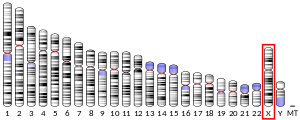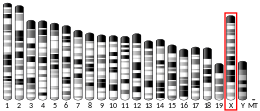تتراسپانین-۶
تتراسپانین-۶ (انگلیسی: etraspanin-6) یک پروتئین است که در انسان توسط ژن «TSPAN6» کُدگذاری میشود.[۵][۶] این پروتئین جزئی از خانوادهٔ تتراسپانینهاست که بیشتر آنها پروتئینهای سطحی سلول بوده و ۴ دومِـین آبگریز دارند. این پروتئینها میانجی انتقال سیگنال و پیامهای سلولی هستند که در تنظیم تکامل سلولی، فعالسازی مولکولی، رشد و حرکت سلولی نقش دارند.
منابع
ویرایش- ↑ ۱٫۰ ۱٫۱ ۱٫۲ GRCh38: Ensembl release 89: ENSG00000000003 - Ensembl, May 2017
- ↑ ۲٫۰ ۲٫۱ ۲٫۲ GRCm38: Ensembl release 89: ENSMUSG00000067377 - Ensembl, May 2017
- ↑ "Human PubMed Reference:". National Center for Biotechnology Information, U.S. National Library of Medicine.
- ↑ "Mouse PubMed Reference:". National Center for Biotechnology Information, U.S. National Library of Medicine.
- ↑ Maeda K, Matsuhashi S, Hori K, Xin Z, Mukai T, Tabuchi K, Egashira M, Niikawa N (Dec 1998). "Cloning and characterization of a novel human gene, TM4SF6, encoding a protein belonging to the transmembrane 4 superfamily, and mapped to Xq22". Genomics. 52 (2): 240–2. doi:10.1006/geno.1998.5415. PMID 9782095.
- ↑ "Entrez Gene: TSPAN6 tetraspanin 6".
- مشارکتکنندگان ویکیپدیا. «TSPAN6». در دانشنامهٔ ویکیپدیای انگلیسی، بازبینیشده در ۱۶ اکتبر ۲۰۲۲.
برای مطالعهٔ بیشتر
ویرایش- Berditchevski F (2002). "Complexes of tetraspanins with integrins: more than meets the eye". J. Cell Sci. 114 (Pt 23): 4143–51. doi:10.1242/jcs.114.23.4143. PMID 11739647.
- Todd SC, Doctor VS, Levy S (1998). "Sequences and expression of six new members of the tetraspanin/TM4SF family". Biochim. Biophys. Acta. 1399 (1): 101–4. doi:10.1016/s0167-4781(98)00087-6. PMID 9714763.
- Strausberg RL, Feingold EA, Grouse LH, et al. (2003). "Generation and initial analysis of more than 15,000 full-length human and mouse cDNA sequences". Proc. Natl. Acad. Sci. U.S.A. 99 (26): 16899–903. Bibcode:2002PNAS...9916899M. doi:10.1073/pnas.242603899. PMC 139241. PMID 12477932.
- Matsuda A, Suzuki Y, Honda G, et al. (2003). "Large-scale identification and characterization of human genes that activate NF-kappaB and MAPK signaling pathways". Oncogene. 22 (21): 3307–18. doi:10.1038/sj.onc.1206406. PMID 12761501.
- Clark HF, Gurney AL, Abaya E, et al. (2003). "The secreted protein discovery initiative (SPDI), a large-scale effort to identify novel human secreted and transmembrane proteins: a bioinformatics assessment". Genome Res. 13 (10): 2265–70. doi:10.1101/gr.1293003. PMC 403697. PMID 12975309.
- Gerhard DS, Wagner L, Feingold EA, et al. (2004). "The status, quality, and expansion of the NIH full-length cDNA project: the Mammalian Gene Collection (MGC)". Genome Res. 14 (10B): 2121–7. doi:10.1101/gr.2596504. PMC 528928. PMID 15489334.
- Ross MT, Grafham DV, Coffey AJ, et al. (2005). "The DNA sequence of the human X chromosome". Nature. 434 (7031): 325–37. Bibcode:2005Natur.434..325R. doi:10.1038/nature03440. PMC 2665286. PMID 15772651.
- Otsuki T, Ota T, Nishikawa T, et al. (2007). "Signal sequence and keyword trap in silico for selection of full-length human cDNAs encoding secretion or membrane proteins from oligo-capped cDNA libraries". DNA Res. 12 (2): 117–26. doi:10.1093/dnares/12.2.117. PMID 16303743.





